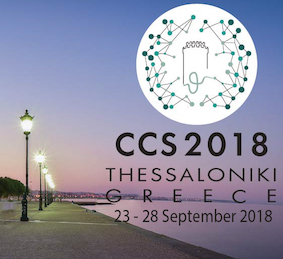This is a quick report on my first participation to a Complex systems conference 2 weeks ago in Thessaloniki, Greece (http://ccs2018.web.auth.gr/). We were 2 from Luxembourg attending: Kaarel had a contribution within the “Evolution of Cultural Complexity”, while I was kindly invited by Elsa Arcaute (CASA, UCL) for a guest talk within the UrbanSys satellite.
My first feeling was kind of uncomfortable on the first days with a kind of tabula rasa perspective to research. How can so many and so clever mathematicians and physicists (mostly) really get the grips on the most salient aspects of the research they address, given they seem to apply their skills to so many different topics from one day to the other? The common starting point seemingly being to have a big dataset. If geographers are seen as butterflies by economists (Duranton and Rodríguez-Pose) who think of themselves as lions, what would the latter think of complexity people?! Overall kind of frustration that complexity research seems to lack embedding of their research questions in existing literature. Setting this aspect aside (hoping that embedding is better in written pieces rather than talks) then the quality of the research is definitely overwhelming and reconciling: clarity and simplicity in formulation, clear cut interpretations. Delightful.
Beyond this general impression, the geography oriented research I listened to were definitely great. Not the least was the plenary by Céline Rozenblat from Lausanne on the second day, who entertained us visually and theoretically with a multi-scale network approach. An impressive talk showing a micro understanding of firms location and their role on the global organisation of cities. Very surprising to hear how much of intra-firm interactions are still actually happening within single cities despite the global connections. Also the way she used her empirical results across scales to move from resilience and adaptiveness to the idea of panarchy looked so evident from her work and promising. A specific workshop was then devoted to Open Mole and the computational exploration of models with geographical examples. The SpaceNet workshop also had a couple of talks related to cities (http://spacenet.sci-app.com/), including a very original talk I find by Enzo Nicosia (Queen Mary, London) on street network patterns, taking an areal approach rather than a street graph approach to let the shape of urban blocks emerge. A discovery was also (at least for me) the paper given by Ruiqi Li based on his recent Nature paper. Very dense and rich (too much maybe given again the connection to previous modelling work was rather scarce and details on formulations and parameters absent) presentation that resonates with some of our recent findings with Rémi Lemoy (soon in Env. & Plan. B) on density profiles and previous theoretical work with my S-GHOST fellows (Cavailhès, Frankhauser, Peeters, Thomas, Vuidel) on the emergence of sprawl patterns.
The paroxysm for an urban modeller was then the UrbanSys satellite. A total enjoyment and good occasion to know better the work of Diego Rybski (Potsdam Institute for Climate Impact Research) who shares very similar interests and ways to address intra-urban structures and their scaling. The perspective offered by Dino Pedreschi (Pisa), although not geographical, finished to convince myself about the relevance of the complex systems research perspective. Not quite the exact quote, but in essence he said: “It is fake news that data driven approach will suffice, it needs theory!”. This is exactly what I wanted to hear! I then felt as a fish in water when presenting after a long long day our empirical research on the scaling of urban land and density profiles (with Rémi Lemoy) and of radial road networks (with Rémi and Estelle Mennicken) to which I adjoined some new set of theoretical simulations to better understand the origins of these structures and their scaling.

